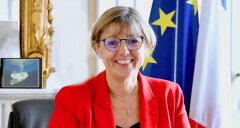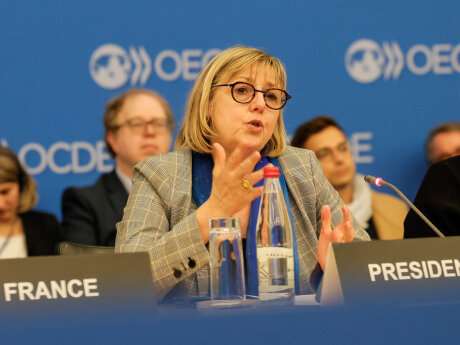
ExclusiveOECD ministerial council meeting: "A success of scientific diplomacy" (S. Retailleau to News Tank)
"The discussions over the last two days have been a great success of scientific diplomacy", says Sylvie Retailleau, French Minister for Higher Education and Research, to News Tank on 26/04/2024. She co-chaired the ministerial meeting of the OECD
Organisation for Economic Co-operation and Development
's Committee for Scientific and Technological Policy (CSTP) in Paris on 23 and 24/04. The meeting resulted in the "Declaration on Transformative Science, Technology and Innovation Policies for an Inclusive and Sustainable Future", adopted by 44 countries and the EU
European Union
.
"The world is getting tougher, as evidenced by the multiple health, environmental and geopolitical crises. In this context, the adoption of this declaration, unanimously and almost ten years after the last equivalent meeting in Korea, is a notable success. This declaration also clearly shows that the international scale is the right scale for public STI
Science, Technology and Innovation
policies", adds the Minister.
"In France, we can link this declaration and these commitments to the speech by the President on 07/12/2023 on confidence in the future of research."
"This declaration will enable us to work together between countries at a multilateral level, but also bilaterally", particularly on AI
Artificial intelligence
. "We realise that we need forums for exchange between governments, between regulators, on the norms and standards applicable in this brand new field."
At the ministerial, she also emphasised three points:
• science as a "junction between societies";
• open science and open data access policies;
• the oceans, while France will be co-chairing with Costa Rica the Unoc3 (3rd United Nations Conference on the Oceans) in Nice in 2025.
A declaration on the "need for collaboration between countries, together with the need for security and responsibility"
The ministerial meeting of the OECD CPST was held on 23 and 24/04/2024 in Paris. How did it go and were the objectives achieved?
The aim of this ministerial meeting, chaired by France, was to discuss and confirm the alignment of transformative science, technology and innovation policies for all countries, in order to work towards a sustainable and inclusive future.
The discussions over the two days were a great success of scientific diplomacy. The world is getting tougher, as evidenced by the many health, environmental and geopolitical crises. In this context, the adoption of this declaration, unanimously and almost ten years after the last equivalent meeting in Korea, is a notable success.
This declaration also clearly shows that the international level is the right one for STI Science, Technology and Innovation public policies. At the OECD Organisation for Economic Co-operation and Development , in a multilateral forum, the most repeated keywords were cooperation and collaboration. There are 38 member countries of the OECD, but this ministerial meeting brought together a remarkable sixty or so countries, including candidate countries for OECD membership such as Peru, Brazil and Argentina, and non-member countries such as Morocco and South Africa.
For France, already a strong player at European level, the OECD represents one of the most important international levels.
In my view, shared values underpinned the adoption of the declaration. »In a plenary session just before the closing session, the ministerial addressed the challenges of open science, in particular the major role of data sharing.
The declaration focuses on the need for collaboration between countries, together of course with the need for security and responsibility for everyone. The fact that this framework is based on shared values - inclusiveness, sustainable development, etc. - was, in my view, a factor in the adoption of the declaration.
Several of the commitments made in the declaration relate to both financial and human resources, at a time when investment in R&D seems to be slowing down in the OECD...
Overall, we are in a difficult geopolitical and economic context, where we have to make choices that are the responsibility and sovereignty of each country. But it is true that all of these countries are sending out an important message, affirming together the importance of science, technology and innovation, to project ourselves into the future and prepare it for younger generations.
At the conclusion of the ministerial meeting, Austria, which held the vice presidency along with five other countries, gave a reminder of the increase in its investment in research. And in France, we can link this declaration and these commitments to the speech by the President of the Republic on 07/12/2023 on confidence in the future of research.
The four pillars of the declaration
The "Declaration on Transformative Science, Technology and Innovation Policies for an Inclusive and Sustainable Future" is based on "four pillars in which adherents make commitments and ask the OECD to support their efforts":
• designing and implementing transformative science, technology and innovation policies;
• strengthening the integration of shared values in international co-operation and technology governance;
• making science, technology and innovation more inclusive;
• strengthening the evidence base to support the development of STI strategies and policies.
It was adopted by all OECD members except Israel, whose delegation was unable to attend the meeting, the OECD tells News Tank on 26/04/2024, as well as by seven non-member countries and the European Union.
You chaired this meeting. What position did you wish to put forward on behalf of France?
France's position is in line with the common position, but we insisted on certain points.
For us, "Science" with a capital "s", i.e. science, technology and innovation, is a real link between societies. At a time when all nations and the world are going through very serious crises, science can bring different countries together and be a vector, not only for solutions to challenges, but also for scientific diplomacy and openness to shared democratic values.
The second point concerns open science and open data access policies, which are strongly supported in France, without being naïve about the issues of security and responsibility. We are also positioning ourselves in relation to the various nationalist withdrawals that can be observed, sometimes with an inclination towards issues of sovereignty and technological security.
Open science: scientific cooperation can define a framework »These two movements of open science and security-responsibility must not clash. We need to find a way of bringing them to life: this is where scientific cooperation can define a framework for both sharing the data needed for scientific advances and enabling countries to maintain a degree of sovereignty and the development of their industries and technologies.
The last topic we addressed, in particular at the working dinner on 23/04, was the oceans, focusing on the impact of climate change and pollution. France and Costa Rica will co-chair Unoc3 (United Nations Conference on the Oceans) in Nice in 2025, and this ministerial meeting at the OECD was an opportunity for us to highlight the vital natural reserve represented by our oceans in the discussions, in connection with the theme of sustainable development.
After the ministerial meeting and the declaration, what are the next steps at OECD level?
This declaration will enable us to work together with other countries at a multilateral level, but also bilaterally, as these days have also been an opportunity to hold talks with my counterparts.
The OECD's Committee for Scientific and Technological Policy (CSTP) will use this declaration as a basis not only for setting priorities, but also for the multilateral cooperation agenda in various areas.
AI was one of the areas discussed at length »AI, for example, was one of the areas discussed at length as an emerging technology. The issues of open science, data sharing, ethics, integrity and sovereignty are well reflected in this field. This is also why, with our OECD and non-OECD partners, we have invested heavily in the Global Partnership on Artificial Intelligence, created in 2018 and supported by the organisation, as the embryo of international AI governance.
With the acceleration of technology and public access to generative AI, we realise that we need forums for exchange between governments and regulators on the norms and standards applicable in this brand-new field.
Are there any future projects between France and other countries following these bilateral meetings?
As I mentioned, we had three bilateral meetings as part of the OECD ministerial. The first was with the United States, which we know well through the G20 and the G7. During my visit to Washington with the President in 2022, I signed an agreement concerning cooperation between France and the United States in the field of quantum technology, which has already led to a joint call for projects. For this bilateral meeting, we were looking ahead to the preparation of our next Science and Technology Joint Venture in 2025. We discussed ways of working together on cross-cutting issues, emerging technologies such as AI, the oceans and open science.
With New Zealand, I had an initial meeting with Judith Collins, New Zealand's Minister for Science, Innovation and Technology. We reiterated our shared commitment to existing cooperation tools such as the PHC (Partenariat Hubert Curien), which encourages researchers to move to other countries. It was also an opportunity to discuss the role of cooperation on an Indo-Pacific scale, in particular between New Zealand and New Caledonia, as France has overseas universities in New Caledonia and French Polynesia. We've also listed a number of subjects we will work on together: AI, quantum mechanics and renewable energies.
As for Costa Rica, we discussed at length the preparations for Unoc. We also want to strengthen a number of research themes and collaborations between our universities, which play a central role in the organisation of research in Costa Rica.
Bilateral agreement with Morocco outside the OECD: "An elaborate work plan"
"On 22/04 I also met Abdellatif Miraoui, Morocco's Minister for Higher Education, Scientific Research and Innovation. There is a very strong desire on both sides to officially reinvigorate cooperation", says Sylvie Retailleau.
"A work plan has been drawn up to:
• increase mobility, particularly at doctoral level.
• improve cooperation across the full range of university and school courses;
• and identify common areas of cooperation in research.
We then visited the SCAI (Sorbonne Centre for Artificial Intelligence), which was a good example of the existing collaboration that we want to strengthen.

Sylvie Retailleau
Membre du conseil de surveillance @ Institut Curie
Professeure des universités @ Université Paris-Saclay (EPE)
Visit in the directory
Career
Membre du conseil de surveillance
Professeure des universités
Ministre de l’enseignement supérieur et de la recherche
Présidente de la commission recherche et innovation
Présidente
Membre de la CP2U
Présidente
Présidente
Doyenne de la faculté des sciences
Vice-Doyenne, Directrice des formations de l’UFR de Sciences
Responsable du Master IST (Information, Systèmes, Technologie)
Maitresse de conférences
Studies & Diploma
Doctorat en sciences
Agrégée de physique appliquée
# 16753, created on 24/03/16 at 19:21 - Updated on 27/11/25 at 17:40
© News Tank Academic - 2025 - French copyright law: "Infringement of copyright (...) is punishable by three years imprisonment and a €300,000 fine. Infringement consists of all forms of reproduction, display or circulation of any intellectual work, in any medium, in violation of the rights of the author."
